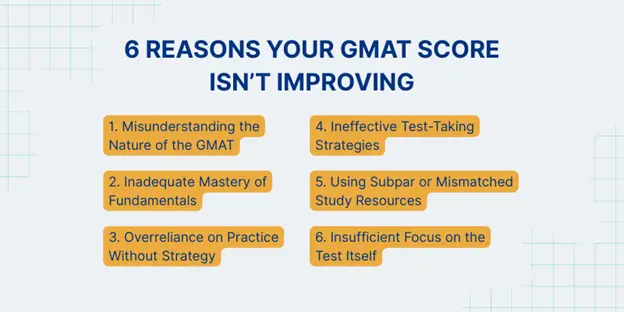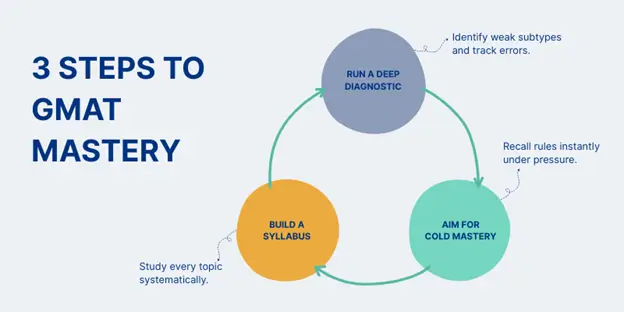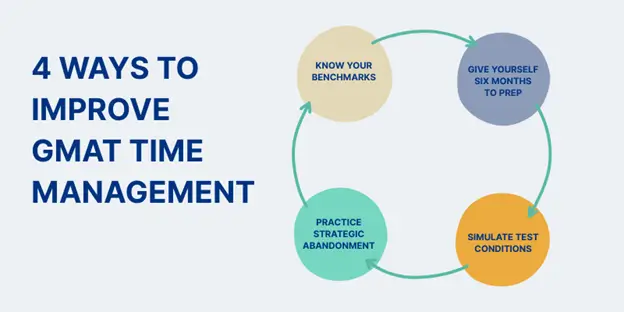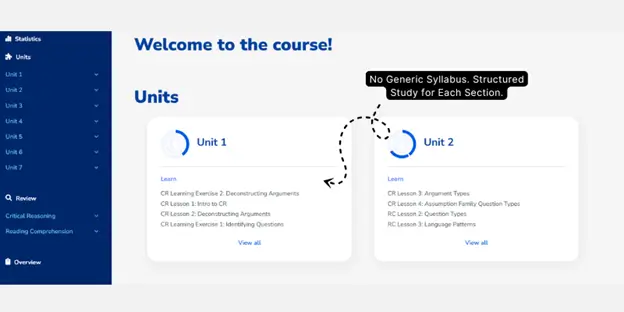Why Is My GMAT Score Not Improving?

You’ve put in the hours.
Your desk is stacked with books and notes, coffee cups mark your effort, and yet, after countless practice tests, your GMAT score still won’t budge.
The thought hits you again: Why is my GMAT score not improving?
You’re not alone. Almost every serious test-taker encounters the dreaded GMAT plateau.
But here’s the truth: a stagnant score doesn’t mean you’ve reached your limit.
More often, it means your current prep strategy has maxed out. And breaking through requires more than sheer effort.
What you need is a clear diagnosis of why you’re stuck, and a smarter, targeted approach to push past it.
6 Reasons Your GMAT Score Isn’t Improving
This article will break down the most common reasons behind a plateau and show you how to restart your upward climb, efficiently, strategically, and with purpose.

1. Misunderstanding the Nature of the GMAT
The single most fundamental mistake test-takers make is misjudging what the GMAT actually is.
If you approach it like a typical university exam, a test of memorized facts and formulas, you are setting yourself up for a GMAT preparation challenge that you cannot win.
Here’s what you need to know:
The GMAT Tests Reasoning, Not Just Knowledge
The GMAT is a timed exam of reasoning and is designed to find future managers who can analyze complex data, spot logical flaws, and make sound decisions with incomplete information.
How it shows up on the test:
- Quantitative Reasoning: This is not a formulas quiz; instead, you must select the appropriate tool (e.g., Pythagoras) and apply it to a multi-step problem.
- Verbal Reasoning: Sentence Correction rewards clarity and concision; Critical Reasoning tests your ability to break down arguments, spot assumptions, and judge evidence.
- Data Insights: Multi-source sets (tables, charts, text) force you to synthesize and draw practical conclusions, the closest thing to real business decision-making on the exam.
The Solution: Shift Your Mindset and Develop Problem-Solving Strategies
To overcome this first major hurdle, you must transition from being a “student” to being an “analyst.”
- Focus on “Why,” Not Just “What.”
For every question you answer, especially during review, don’t stop at knowing the correct answer. Ask yourself:
Why is this the right answer?
- Why are the other choices wrong? (This is often more important.)
- What was the key insight or logical step that unlocked this problem?
- How did the test makers try to trick me?
- Learn the Patterns
The GMAT reuses logical structures and trap answers. Your goal is to see the blueprint behind the question.
- Prioritize Process Over Answer
Develop a consistent, step-by-step method for tackling each question type. With a solid process, you can avoid panicking and making careless errors under time pressure.
2. Inadequate Mastery of Fundamentals
A skyscraper can’t stand on a weak base, and neither can your GMAT score.
Even many re-takers, even those confident in math or English, rush past the basics and pay the price.
Neglecting Core Concepts
It’s not enough to “know” what a prime number is, you need to apply it quickly, calculate factors, and handle exponents with ease.
Verbal, you must spot modifiers, idioms, and subtle grammar traps every time.
GMAT score plateaus often come from small gaps: a missed sign rule, a shaky percentage formula, or confusion between “that” and “which.”
These fundamentals, not advanced tricks, are usually what keep scores stuck.
The Solution: A Structured, Sequential Approach to Mastery

Here’s how you can overcome this:
- Run a Deep Diagnostic: Don’t just check section scores, pinpoint weak subtypes (e.g., rates, weaken questions, pronouns). Build an error log and use it.
- Build a Syllabus: Cover every GMAT topic systematically, not at random. Treat prep like a course with time allotted for each concept.
- Aim For Cold Mastery: Know rules so well you can apply them instantly under pressure. This fluency frees your mind for higher-level reasoning.
3. Overreliance on Practice Without Strategy
This is perhaps the most common trap.
The belief that “more practice = higher score” is only true if the practice is strategic.
Mindlessly completing thousands of problems without a purposeful review process is the surest path to a GMAT score plateau.
Practicing Without Purpose
It’s good that you’re practicing, but are you practicing right?
Simply drilling dozens of questions without reflection can lead to a plateau. Imagine taking practice tests mindlessly: you might see only the same GMAT study mistakes over and over.
You might recognize the patterns of questions you’ve seen before, but you’re not developing the adaptive skills needed to tackle novel problems on the actual exam.
The Solution: Embrace Deliberate Practice and Meticulous Analysis
Improvement doesn’t come from doing more questions, it comes from analyzing them better.
For this, you must create and maintain an error log. For every question you get wrong (or even get right but guess on or find difficult), you should log.
This data allows you to target your studies with precision, turning your biggest weaknesses into strengths, and improving GMAT score.
4. Ineffective Test-Taking Strategies
You can have perfect content knowledge and still score poorly on the GMAT.
The exam is a marathon of mental endurance, and poor strategy can derail even the most prepared candidate.
Remember, two of the biggest strategic pitfalls are time management and test anxiety.
Lack of Time Management
A string of wrong answers at the end of a section is a classic sign of a time management collapse.
You might spend too long on a few difficult questions early on and then rush-guess on the last 5-7 questions, which can devastate your score.
As a result, the GMAT’s computer-adaptive algorithm penalizes unanswered questions heavily.
The Solution: Develop a Pacing Plan and Build Stamina

Here’s how to do it:
- Know Your Benchmarks: A good general pacing guideline is 2-2.5 minutes per question.
- Give Yourself Six Months: This is a solid timeline to build skills without rushing, flexible enough to fit around real life.
- Practice Strategic Abandonment: If you’ve spent 2.5-3 minutes on a question and are no closer to an answer, you must guess, mark it, and move on.
- Simulate Test Conditions: When taking practice sets or full-length exams, replicate the real environment as closely as possible: no pauses, no unscheduled breaks, no phone distractions.
Failure to Address Test Anxiety
For many, the pressure of the high-stakes testing environment causes anxiety.
This isn’t just “nerves”; it’s a physiological response that can impair working memory, focus, and logical reasoning.
Due to this, you might blank on concepts you know cold or misread simple questions.
The Solution: Build Confidence Through Preparation and Practice Calming Techniques
Confidence comes from certainty. If you have followed a structured plan, mastered the fundamentals, and know your pacing strategy inside and out, you will feel more in control.
So, when you feel anxiety rising during the test, have a simple tool to use.
For example, a quick and effective method is “box breathing”: inhale for 4 seconds, hold for 4 seconds, exhale for 4 seconds, hold for 4 seconds.
Doing this for just 30-60 seconds during your optional breaks can reset your nervous system and clear your mind.
5. Using Subpar or Mismatched Study Resources
Not all GMAT prep materials are created equal.
Using outdated, poorly written, or non-representative resources can actively harm your preparation by teaching you incorrect GMAT test strategies or giving you a false sense of your abilities.
Reliance on Inaccurate Practice Materials
The GMAT is a unique test with a specific style and language.
If you study with any unstructured GMAT course material, you will be learning the wrong language.
When you get to the official exam, the questions will feel foreign, and your score will not reflect your third-party practice test results.
The Solution: Anchor Your Preparation with Official Materials
Nothing matches the accuracy, tone, and difficulty of official GMAT content, it’s the only true benchmark of your readiness.
Consider the following:
- The Official Guide is Your Foundation: Published by GMAC, it contains retired real questions that perfectly capture the test’s style and traps.
- Leverage Official Mocks: The six practice exams on mba.com use the real algorithm and are the most reliable score predictors.
For example, use Gurutor to connect the dots.
While official content shows you the questions, Gurutor teaches you how to think through them with step-by-step guidance, real-time feedback, and tutor-designed strategies.

Instead of leaving you to interpret the Official Guide on your own, Gurutor ensures you learn from it, making official questions your best training ground, not just more practice.
6. Insufficient Focus on the Test Itself
Finally, many students focus exclusively on content and individual questions but neglect to prepare for the holistic experience of the GMAT.
Neglecting Test Simulation
Answering 20 practice questions in a quiet room with no time pressure is a completely different cognitive task than answering 64 questions in a row under timed conditions in a potentially distracting testing center.
Therefore, if you never practice the full experience, you will not be prepared for the fatigue and focus required.
The Solution: Integrate Regular, Realistic Mock Exams
Regular mock exams train your stamina, sharpen pacing, and make the real test feel like just another practice run.
Here are some helpful tips:
- Schedule Full-Length Practice Test: Slot an official mock every 2–3 weeks and treat it like a milestone event in your prep.
- Analyze Holistically: Don’t just check wrong answers, track your energy, focus, and timing.
For example, if you find yourself fading in late to Verbal or rushing through Quant, adjust your practice to build endurance and refine your pacing.
Conclusion
A stagnant GMAT score can feel frustrating, but it’s not permanent, it’s simply a signal that your current approach has reached its limit.
To move forward, you need more than effort; you need strategy.
That said, improvement comes from respecting the GMAT as a test of executive reasoning, mastering the fundamentals with cold precision, and replacing endless drilling with deliberate, feedback-driven practice.
Additionally, it requires a structured approach, effective time management, stamina building, and mental composure under pressure.
Given this, breaking through the question “why is my GMAT score not improving” is challenging but entirely achievable.
With diagnosis, targeted adjustments, and a smarter plan, you can turn stagnation into momentum and see your preparation finally translate into the score you’ve been working toward.
Ready to Transform Your GMAT prep & Break Your Score Plateau?
Don’t waste another week wondering why your GMAT score isn’t improving.
Gurutor provides structured strategies, real-time feedback, and official practice to help you move the needle toward your target score.
Start now and try the first unit for free!
